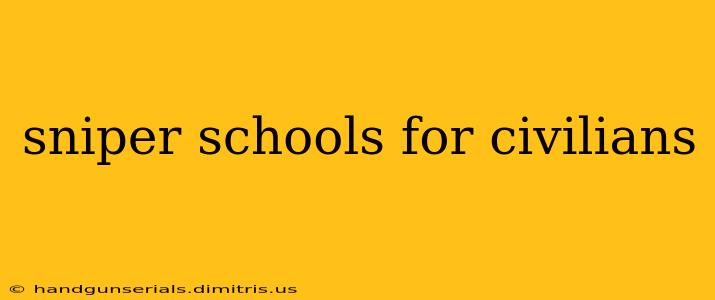The allure of precision marksmanship and the challenge of long-range shooting attract many civilians. Whether driven by competitive shooting, hunting, or personal self-improvement, the desire to learn sniper techniques is understandable. But finding reputable and safe civilian sniper schools requires careful research. This guide will help you navigate the options and understand what to look for in a quality program.
Understanding the Civilian Sniper Training Landscape
It's crucial to distinguish between military sniper training and civilian courses. Military training is intensive, often involving extended field exercises and combat scenarios. Civilian courses focus on the fundamental skills needed for precision shooting, often in a safer, controlled environment. They emphasize safety, responsible gun handling, and ethical considerations above all else.
Finding a reputable school requires investigating several key areas:
Instructor Qualifications and Experience
Look for instructors with verifiable experience in precision rifle shooting. Their backgrounds should be transparent, detailing their qualifications, certifications, and competition history (if applicable). A proven track record in training civilians is also a significant plus. Check reviews and testimonials from past students to gauge the instructors' teaching style and effectiveness.
Course Curriculum and Content
A comprehensive course should cover a wide range of essential topics, including:
- Fundamentals of marksmanship: Proper stance, grip, breathing techniques, trigger control – the bedrock of accurate shooting.
- Ballistics and trajectory: Understanding how environmental factors like wind, temperature, and elevation affect bullet flight is critical for long-range accuracy.
- Optics and sighting systems: Proper use and maintenance of scopes and other sighting equipment are crucial.
- Fieldcraft and stalking: This involves techniques for concealment, observation, and movement in different terrains. (Note: the intensity of this training will vary significantly between schools.)
- Weapon maintenance and care: Proper care of your rifle is essential for maintaining accuracy and safety.
- Safety protocols: This is paramount. A responsible school will prioritize safe gun handling practices throughout the course.
Facilities and Equipment
The school's facilities should be well-maintained, safe, and equipped to handle long-range shooting. They should provide the necessary equipment, or clearly specify what students are required to bring. Check for clear safety guidelines and emergency procedures.
Cost and Value
While price is a factor, don't solely prioritize the cheapest option. Consider the value provided by the instructor's expertise, the quality of the facilities, and the comprehensiveness of the curriculum.
Finding Reputable Civilian Sniper Schools
Your search should start with online research. Look for schools with established reputations, positive reviews, and transparent information about their courses and instructors. Consider joining online forums and communities dedicated to long-range shooting; other enthusiasts can offer valuable insights and recommendations.
Remember: Thorough research is key. Don't rush into a decision. Take your time to compare different schools, evaluate their offerings, and choose the program that best fits your needs, budget, and skill level.
Ethical Considerations and Responsible Gun Ownership
Learning sniper skills comes with significant responsibility. Always prioritize safe gun handling, respect for the law, and ethical considerations. Use your skills responsibly and within the bounds of the law.
This article serves as a guide; it does not endorse any specific sniper school. Always conduct your own due diligence before enrolling in any training program. Responsible and ethical gun ownership is crucial.

